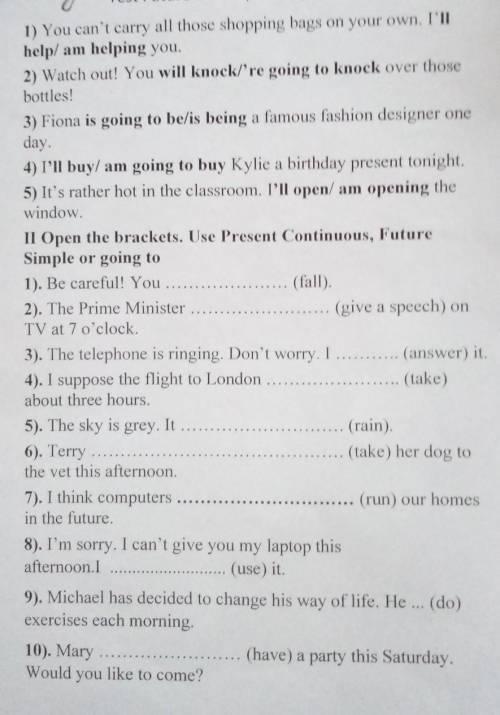1) You can't carry all those shopping bags on your own. I'll help/ am helping you.
2) Watch out! You will knock/'re going to knock over those
bottles!
3) Fiona is going to be/is being a famous fashion designer one
day.
4) I'll buy/ am going to buy Kylie a birthday present tonight.
5) It's rather hot in the classroom. I'll open/ am opening the
window.
II Open the brackets. Use Present Continuous, Future
Simple or going to
1). Be careful! You
(fall).
2). The Prime Minister
(give a speech) on
TV at 7 o'clock.
3). The telephone is ringing. Don't worry. I (answer) it.
4). I suppose the flight to London
(take)
about three hours.
5). The sky is grey. It
(rain).
6). Terry..
(take) her dog to
the vet this afternoon.
7). I think computers
(run) our homes
in the future.
8). I'm sorry. I can't give you my laptop this
afternoon. I
(use) it.
9). Michael has decided to change his way of life. He ... (do)
exercises each morning.
10). Mary.
(have) a party this Saturday.
Would you like to come?
решите,

Другие вопросы по теме Английский язык
Популярные вопросы
- Выпишите причастия 1)настоящего времени сначала, далеко впереди, где небо сходится...
1 - Іть! зробіть фонетичний розбір слова індія!...
3 - Втреугольнике abc a состовляет 54градуса, а c на 15градусов меньше.найди b треугольника...
1 - При паяние изделий из жестиприменяют сплав содержащий 2 части свинца и 5 частей...
3 - С, хотя бы немного. 100 . на времена глагола. 1. copy the sentences and note...
1 - Сочинение о моём классе шесть предложений на...
1 - Сравните числа и запишите ответ в виде неравенства: а) 0 и -140 б) 0 и 25 в)...
2 - Просклоняйте числительные: 201, 505, 873, обе, трое....
2 - Зарубіжка: твір 1) мої думки з приводу прочитаного твору гофмана крихітка , 15...
2 - Создать письменно текст рассказ характеристику любимого героя...
2
- In this situation, the speaker is offering immediate help to the person who is carrying the shopping bags. Both "I'll help" and "am helping" are correct, but they convey slightly different meanings. "I'll help" indicates a future action, implying that the speaker will start helping soon. "Am helping" suggests that the speaker is already assisting with the bags at the moment of speaking.
2) Watch out! You will knock/'re going to knock over those bottles!
- This statement is a warning about a possible accident with the bottles. Both "will knock" and "are going to knock" are correct, but they have different nuances. "Will knock" is used to express a future event that is likely or certain to happen. "Are going to knock" implies that the action is planned or intended to happen in the near future.
3) Fiona is going to be/is being a famous fashion designer one day.
- This sentence describes Fiona's future career as a fashion designer. Both "is going to be" and "is being" are correct, but they convey different meanings. "Is going to be" suggests that becoming a famous fashion designer is Fiona's goal or plan. "Is being" implies that she is already in the process of becoming a fashion designer.
4) I'll buy/ am going to buy Kylie a birthday present tonight.
- This statement talks about the speaker's intention to purchase a birthday present for Kylie. Both "I'll buy" and "am going to buy" are correct, but they have different nuances. "I'll buy" indicates a spontaneous decision to buy the present, while "am going to buy" suggests that the speaker has already planned to buy the present.
5) It's rather hot in the classroom. I'll open/ am opening the window.
- This sentence describes the speaker's response to the hot temperature in the classroom. Both "I'll open" and "am opening" are correct, but they convey slightly different meanings. "I'll open" suggests a future action, indicating that the speaker will open the window soon. "Am opening" implies that the speaker is currently in the process of opening the window.
II Open the brackets. Use Present Continuous, Future Simple, or going to
1). Be careful! You (fall).
- Be careful! You are going to fall.
2). The Prime Minister (give a speech) on TV at 7 o'clock.
- The Prime Minister is going to give a speech on TV at 7 o'clock.
3). The telephone is ringing. Don't worry. I (answer) it.
- The telephone is ringing. Don't worry. I'll answer it.
4). I suppose the flight to London (take) about three hours.
- I suppose the flight to London will take about three hours.
5). The sky is grey. It (rain).
- The sky is grey. It is going to rain.
6). Terry..(take) her dog to the vet this afternoon.
- Terry is taking her dog to the vet this afternoon.
7). I think computers (run) our homes in the future.
- I think computers will run our homes in the future.
8). I'm sorry. I can't give you my laptop this afternoon. I (use) it.
- I'm sorry. I can't give you my laptop this afternoon. I'm using it.
9). Michael has decided to change his way of life. He... (do) exercises each morning.
- Michael has decided to change his way of life. He is going to do exercises each morning.
10). Mary. (have) a party this Saturday. Would you like to come?
- Mary is having a party this Saturday. Would you like to come?